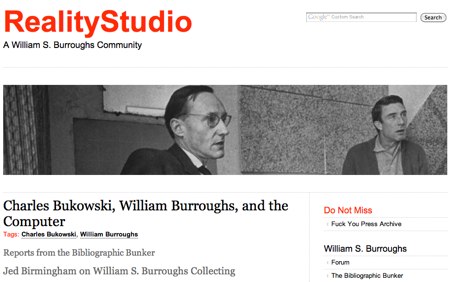Bukowski and Burroughs Buy a Computer
Stacey Mason

A fascinatingting article by Jed Birmingham follows the aging of Charles Bukowski and William Burroughs as they move into the computer revolution, focusing on how their work changed with the technology. Though the Birmingham is careful not to call Bukowski a pioneer of the level of Michael Joyce , he does note how innovations such the ability to quickly capture thoughts and edit/delete functions greatly influenced Bukowski’s work.
In late 1992, Bruce Kijewski approached Bukowski with the idea of electronic books. Bukowski was intrigued. He wrote back, “Yes, you have a strange project: electronic books. It might be the future as more and more people find that the computer is such a magic thing: time-saver, charmer, energizer.” […] But there are still reservations and a sense of nostalgia. The same letter to Kijewski continues, “But, still, when [the electronic book] comes I will still miss the old fashioned book.” Despite such statements, it is clear that Bukowski was a writer not afraid of, or pessimistic about, the future.
Occasioned by the opening of the Berg’s William Burroughs digital archive , the second part of article explores Burroughs’ relationship to the computer. It seems he did not use a computer to write. He embraced film, audio recording, and painting, but apparently he never experimented with writing and the computer to the level that Bukowski did.
As far back as the mid-1960s, Burroughs was aware of the possibilities of the computer and computer-generated poetry. In Insect Trust Gazette , Burroughs’ work appears alongside an early computer poem. In his interview with Conrad Knickerbocker in Paris Review, he stated that he had yet to experiment with the computer, but thought that such literature was valid and interesting, if it stood on its own merit. Yet as time passed — again, as far as I know — Burroughs never experimented with the computer. On one level this makes sense given the fact that Burroughs was well advanced in age and set in his ways by the time the personal computer was generally available. You might say you can’t teach an old dog new tricks, but Bukowski proves that you, in fact, can.
